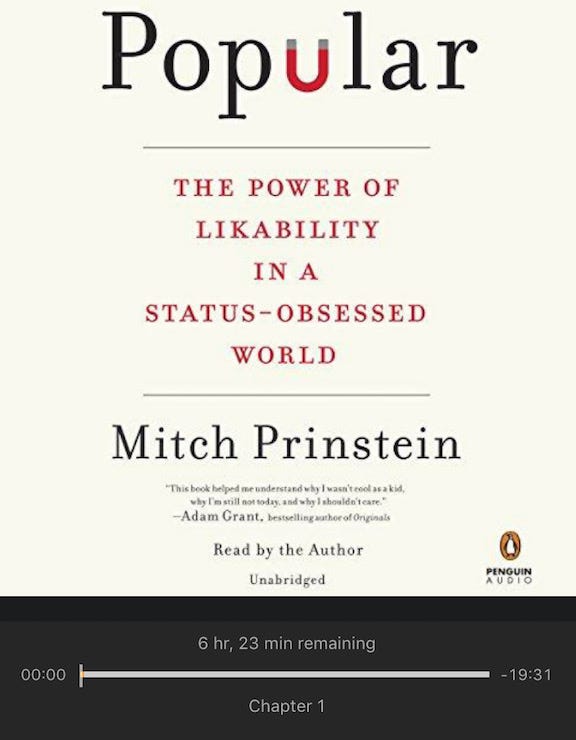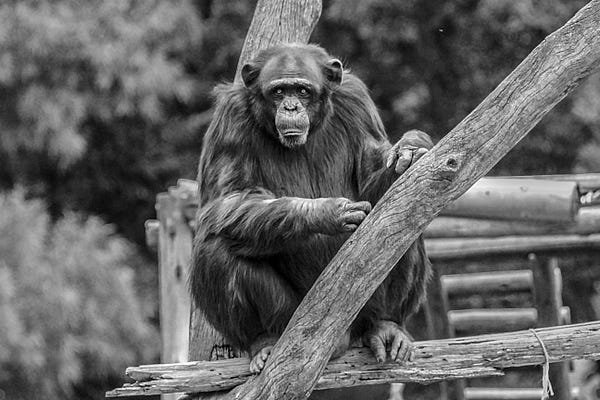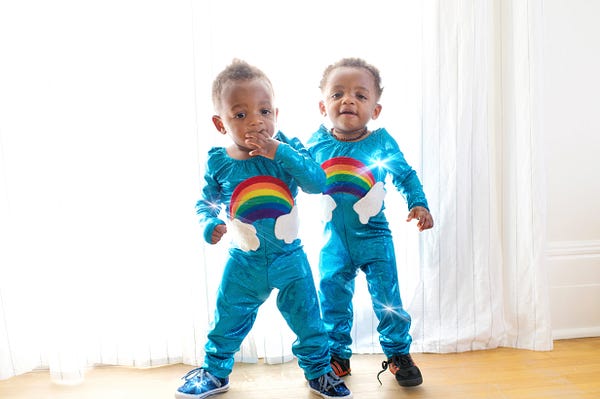Popular: The Power of Likability in a Status-Obsessed World by Mitch Prinstein

We all want to be popular. If we don’t, that’s probably been taught into us. Why is it so important to us? Why does it matter to people? I wanted to know, so I decided that this audiobook would be excellent — it was. I learned a lot about not only myself but humans in general. The author talked about similar emotions that parents have just because their children are in a similar environment. I remember in late elementary school and early middle school that all the “cool kids” rode the bus. I was the odd one out with my Mom still driving me to school. She wanted to save me from some of the bullying that she experienced while on the bus. We came to an agreement and I rode the bus, I’m not sure if it attributed to my popularity (which really was just likability as the book explains) but I definitely did get bullied — and I’m a better person because of it. This book opened my eyes to many many things.
There was a story that the author featured of a man pitching a plot of land for development. There was someone else who had pitched the city counsel for the same development a few years prior and was turned away. Below are the things that speaker did to receive a unanimous yes from all counsel members. The speaker told the gentleman who unsuccessfully pitched to the counsel in the past that it must have been because of the extensive numbers he pulled from the city archives. In response, he told him that he did all the same things and they voted for him not for what he shared with them. The speaker, pitching the mixed development of the north part of town. Even though 2 council members interrupted a mere 15 minutes into his 3-hour presentation, he persisted with lots of persuasive graphs, town records from the archives, testimonies from experts, and a patient, nondefensive, and constantly enthusiastic demeanor. He calmly described every detail of the planned development. He was firm but open-minded.

I have always been quite interested in the research that Jane Goodall did with chimpanzees. One thing that stood out to me was the relationship between the various chimpanzees in their community. Resources we might think would go first to the strongest, especially because of the saying, “survival of the fittest.” But what is fittest, what does that really mean? Often, I think that fittest could be defined as smart and hardworking, not just one — but both.
Jane Goodall discovered that chimpanzees want to be popular too. Status determines which members get first access to resources.
Is this surprising to you? Does a good life include money? To me, it really doesn’t. Money provides some things, sure, but what does it provide? Maybe for many people, they believe that it provides or contributes to status or popularity.
Robert Putnam’s 2001 study:
In 1975, 38% of respondents said a good life would include a lot of money,
in 1996, that number had risen to 63%.
This was an incredibly interesting point of data to me. I love personal diaries and think that they are very telling — I know mine is. It’s interesting to see someone’s diary and understand what is important to them. People often write about their feelings and what is important to them in all areas. From her findings, many people don’t write about their times of kindness or community but do share times of fame, power, prestige, and influence. I cannot be too surprised by that after all the communication that I’ve shared with people over the years, and especially recently.
Cornell University historian Joan Brumberg analyzed personal diaries for the past 100 years by examining thoughts to see how desires have changed over the past century.
Fame is in, power, prestige, and influence are hot. Kindness and community? Not so much.
I really don’t think that people should be surprised by any of these things. Ultimately, I see respect and love underlying all things within likable people.
The most likable people:
Cooperate with others, are helpful, share, and follow the rules. They are generally well adjusted, smart — but not too smart. They are often in a good mood, can hold up their end of the conversation but make sure to give others a turn to speak too. They’re creative — especially at solving awkward social dilemmas. Perhaps most important, they don’t disrupt the group.

I’ve always known this and love that there is more data to show that the environment provides so much influence over the type of people that children become as adults. It’s not surprising to me at all that overstressed adults tend to decrease the popularity of their children. Often, being overstressed can connect to short tempers, impatience, lack of consideration, and numerous other things.
Popularity is related not only to the kinds of parents that we have but also to the kinds of parents that we become. One of the factors that most strongly predicts who will be popular and who will be rejected is wherever they are raised in an aggressive social environment, an atmosphere that tends to persist across generations of a family.
Overstressed adults decrease the likelihood that their children will be popular.
This was amazingly interesting to me. I included much of the information that the author shared. It’s crazy to think that in just 5 minutes, parents revealed enough that people could understand their environments. As I’m learning in the book “Atomic Habits” our habits create our identity.
2 psychologists asked almost 600 mothers from England and Wales to spend 5 minutes describing their 5-year-old children. They wanted to discover how warm or critical the children’s environments were. They also wanted to understand if there was a correlation between one’s environment and aggressive or unpopular behavior.

They chose to only include monozygotic twins in their study to ensure any differences in children’s behavior could not be explained by any genetic variation.
Some mothers were warm towards one child and overly critical towards the other. Psychologists Hoffman and Cassidy returned to their subjects 2 years later and at 7 years old, some were highly aggressive while others were well behaved. These results were strongly predicted by the environments in which they grew up.
Mothers who are critical when describing their children, even for 5 minutes, tend to create a more hostile environment for them. Depressed mothers also differ from other mothers, as shown by various research, and one thing they do is discipline their children less effectively as well as spend less time with their children and smile less often.
As someone who could potentially become a parent in the coming years, I found this particularly interesting. Someone I used to follow on Instagram, Justin Baldoni, posted a picture of his daughter having an emotional reaction in the middle of a grocery store. That post has stuck in my head and influenced the way that I intend to parent my children. The author shared a story of someone hurting themselves on the playground and the parent rushing over to help them — that decreases their likelihood of popularity. It’s important to me that my potential future children have freedom and trust. I love what Michele Obama said in her book, “Becoming.” She shared that her mother listened and shared insight but gave her the confidence to make her own decisions and become an adult, trusting she’ll make the right decision. Michele’s mother did an excellent job. I totally agree that doing something similar or the same is essential.
One strong predictor of unpopularity in the future is if parents are hypersensitive towards their child’s emotions and overprotective. Intervening into their social lives has the same effect.
Good friends. Yes yes yes. They’re essential for everyone — extroverts just typically need more or more time with them. As an introvert, I love my good friends but I don’t need to see them all the time. One of my friends, Nick, lives in Minnesota so we talk on the phone for 20–30 minutes once every couple of weeks. I would say we’re closer than ever.

The author shares the story of Lightning McQueen when he decides to give up winning. He tells his son, no matter how much you win, it won’t make you happier than having good friends.
This is not surprising to me. As I learned from Dale Carnegie, he says, “the deepest human craving is appreciation.” We want to be liked. We want to be appreciated. And within who we are, we all desire to be valued by other humans, we are a relational species.
The most gratifying type of popularity comes from making an effort to fit in rather than stand out. It’s popularity through likability, not status that creates the most sustainable happiness.
This book put so much research and science and data behind many many things that I have already believed. I loved getting to learn from what the author had done and what other people in the world believe. It’s important for me to be respected by others and I always strive to act in an ethical, kind, and loving manner — no matter who I’m dealing with. I think that it is essential to focus on who we are and what people know about who we are also. We need to reveal ourselves to people consistently and authentically. It’s essential that people understand us as best as they can, otherwise, they may not know the truth about us.
Like I always love to remind myself, EVERY interaction matters.
I gave this book a 4.5/5